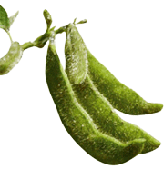Over 235 organisations oppose Round Table on Responsible Soy
A proposed new label for ‘responsible’ soy will not stop deforestation, 235 civil society groups from across the globe warned in a letter today, ahead of a conference set to finalise the labeling scheme in Sao Paulo, Brazil.[1] The 235 groups, including Friends of the Earth International and Corporate Europe Observatory, have written to oppose the Round Table for Responsible Soy (RTRS) certification scheme, which they say could facilitate soy oil being used to meet the EU target for biofuels. This is despite evidence that soy biodiesel is worse for climate emissions than fossil fuels. [2]
The scheme will also label genetically modified (GM) soy as ‘responsible’, despite growing evidence of its risks to human health and the environment. GM Soy resistant to the herbicide glyphosate is increasing the use of other dangerous chemicals as weeds develop resistance to glyphosate. [3]
These chemicals have had devastating impacts on local communities in South America. The spread of soy has also led to violent evictions of small farmers [4].
The RTRS label has also been rejected by major players in the Brazilian soy industry, such as ABIOVE and APROSOJA, who are reluctant to sign up to even weak rules on preventing deforestation. [5]
Kirtana Chandrasekaran from Friends of the Earth International said: “This scheme is a farce – it will brand genetically modified soy grown on deforested land as responsible. Companies that use it will just anger civil society and consumers in Europe and South America who are demanding GM-free food and genuine solutions to deforestation and climate change.”
Vast tracts of tropical forest and grasslands are being destroyed every year in South America due to large scale soy production for animal feeds and biofuels in Europe [6].
In Europe factory farming relies on cheap soy imports for animal feed , causing pollution, health impacts and loss of rural livelihoods. Soy is also imported for use as biofuel.
Kirtana Chandrasekaran added:
“Rather than giving a 'responsible' label to an irresponsible product, we must overhaul factory farming in Europe. This would be good news for farmers, consumers and the environment and will reduce Europe’s global footprint. We need action to do this, not a green scam.”
Nina Holland from the Brussels-based Corporate Europe Observatory said: “In South America communities are fighting against soy expansion that takes ever more land and resources. Only corporations such as Monsanto and Cargill stand to benefit from industrial soy production and they are also the predominant force behind this greenwashing label.”
Friends of the Earth Europe and International and Corporate Europe Observatory and 235 other organisations are calling for:
* phasing out industrial plantations of soy and instead promoting agro-ecological farming systems of local crops
* genuine land reforms and land rights in soy producing countries
* reducing overconsumption and waste in the industrialised world
* abandoning intensive meat, dairy and egg production systems and moving towards low-input livestock systems
* stopping the promotion of agrofuel production as a climate solution for rich countries and instead developing better transport systems that reduce demand for energy and fuel.
FOR MORE INFORMATION CONTACT:
In English
Kirtana Chandrasekaran, FoEI Food Sovereignty Program Co-coordinator
Tel: +44 (0) 20 7566 1669 and +44 (0) 79619 86956
Nina Holland , Corporate Europe Observatory
Tel: tel: +31 630 285 042
NOTES:
[1] According to the RTRS principles agreed previously, “responsible” soy can be grown on land that has been deforested as recently as May 2009. “Responsible” soy can even be grown on land that will be deforested in the future. See www.responsiblesoy.org
[2] The RTRS is trying to gain accreditation under the EU Renewable Energy Directive (RED) that contains the widely opposed 10% agrofuel target. However recent research from the European Commission showed that soy biofuels can cause 4 times more emissions than fossil fuels. See “Soy production and certification: the case of Argentinean soy-based biodiesel”, Tomei, Semino et al, 2010.
[2] For further information on the impacts of the RTRS and the full list of 235 signatories, see:
http://www.corporateeurope.org/system/files/files/openletter/2010_RTRS+L...
[3] Figures from the United States Department of Agriculture show that 26% more pesticides are used on GM crops compared to conventional crops. In Brazil glyphosate use has increased almost 80% in the years of planting. See http://www.foeeurope.org/press/2008/Feb13_GM_crops_pesticide_poverty.html
[4] For more information on the environmental and social impacts of soy please see: http://www.foe.co.uk/resource/briefings/livestock_impacts.pdf
[5] ABIOVE - representing 72 percent of Brazil's soybean processing volume and APROSOJA which represents soy producers from Mato Grosso state - responsible for around 30 percent of national production in Brazil - have turned their backs on the RTRS due to disagreements on the inclusion of even the very weak deforestation clause see http://www.nevedi.nl/UserFiles/File/ABIOVE%20uit%20RTRS.pdf
[6] The EU uses over 16 million hectares of farmland every year, mostly from South America, to feed its livestock and increasingly to fuel its cars See http://www.foe.co.uk/resource/briefings/livestock_impacts.pdf
| Attachment | Size |
|---|---|
| 2010_RTRS Letter - Final-signatures.pdf | 118.13 KB |
| 2010 RTRS Letter - Dutch.pdf | 130.5 KB |
| 2010-Letter RTRS - Spanish.pdf | 87.2 KB |
| 2010 RTRS letter FRANCAIS.pdf | 119.39 KB |



